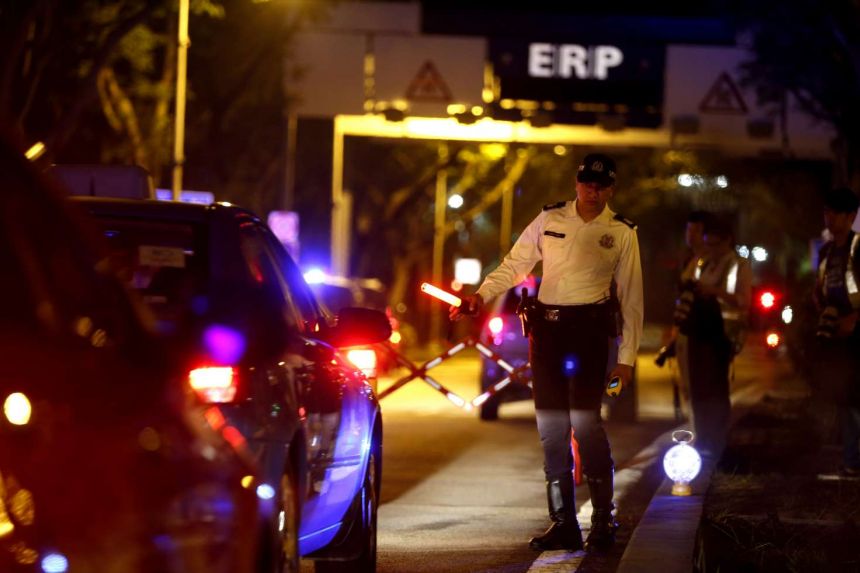33 people convicted or warned over roadblock evasion in past 5 years; 2 directly caused injury to police
Sign up now: Get ST's newsletters delivered to your inbox

A photo from Dec 2, 2015, showing a Traffic Police roadblock in Clemenceau Avenue.
PHOTO: ST FILE
Follow topic:
SINGAPORE - In the past five years, 33 people have been convicted or given stern warnings for evading police roadblocks, with two directly causing injury to officers.
This is out of about 8,000 roadblocks conducted each year from 2016 to last year.
Sharing these figures in Parliament during the debate on the Police Force (Amendment) Bill, Minister of State for Home Affairs Desmond Tan reiterated that motorists who deliberately evade roadblocks seriously endanger the lives of police officers as well as other road users.
Hence, new laws passed on Tuesday (Aug 3) will significantly increase the penalties for evading roadblocks to deter such crimes, he said.
The maximum penalty for roadblock evasion will be raised from a year in jail and a $5,000 fine to seven years' jail and a $10,000 fine.
The definition of roadblock evasion will also be expanded to include cases where an offender stops his vehicle and alights to escape, or makes a U-turn to flee.
Failing to follow a police officer's orders at a roadblock - be it a verbal command, hand sign, or written notice or sign - will be an offence.
Mr Melvin Yong (Radin Mas) asked why the maximum jail term was being raised sevenfold, and whether those who cause injury at roadblocks can be charged under existing laws like voluntarily causing hurt to deter a public servant from his duty.
Mr Tan said roadblock evasion in itself is serious and risky behaviour.
"We should not rely on the offender also committing other offences to be able to take the person to task," he added.
For now, the Ministry of Home Affairs does not think that roadblock evasion warrants mandatory minimum jail sentences, Mr Tan said, in response to Mr Desmond Choo (Tampines GRC). But the ministry will review this after the increased penalties take effect.
The new laws will also vest commercial affairs officers with more powers - allowing them to arrest, detain and search people, as well as require suspects to attend court.
They will also be given bail- and bond-related powers.
Commercial affairs officers are civilian officers who investigate white-collar crime.
Mr Tan said that they will be allowed to exercise these powers only after receiving training, including on legal knowledge, self-defence and scenario-based training.
The Commercial Affairs Department now has about 130 commercial affairs officers and 90 regular police officers, he added.
While commercial affairs officers are able to arrest suspects, they need to ask regular police officers for help if suspects cannot post bail and need to be locked up.
Hence, the new powers are necessary to enhance operational efficiency given a recent uptick in increasingly complex commercial and financial crimes, Mr Tan said.
He added that these officers will only be given powers relevant to their work. They do not have power to seize offensive weapons, for instance.
The authorities are also reviewing the need to equip commercial affairs officers with body cameras to aid investigations and prevent false allegations, Mr Tan said.
Replying to MPs, including Workers' Party chairman Sylvia Lim (Aljunied GRC), who had raised concerns about allowing the Commissioner of Police to delegate some powers to civilian officers, Mr Tan said the intention is to allow the commissioner to delegate more administrative powers, and not his powers of command at the front line.
"We recognise that there are powers which require the specialised knowledge of a police officer who has had years of experience with policing, such as the power to disperse an unlawful assembly by military force," he said.
"These powers are best exercised by the commissioner or police officers in leadership positions, and will remain that way."
On protecting police officers from liability if they act in good faith and with reasonable care, Mr Tan gave scenarios where officers who may fail this standard.
A police officer who makes a forced entry to arrest a suspect without first attempting to verify whether the suspect was actually there would not have acted in good faith and with reasonable care.
This is also the case if a police officer fails to investigate a distress call by an individual known to be a target of repeated physical domestic violence, and the individual dies from injuries from the abuser.
"I want to emphasise that the protection that we will be according to officers is not unconditional," said Mr Tan, adding that the liability of supervisors in the chain of command will depend on the facts of each case.
He also addressed some questions about powers to allow forced entry into premises in medical emergencies, which can range from a stroke to serious falls.
All front-line officers have basic first aid and cardiopulmonary resuscitation skills, Mr Tan said, and they will take into account a variety of factors before making forced entry, such as signs of distress and information from next of kin and neighbours.
Correction note: An earlier version of this story said that the Police Force (Amendment) Bill vested special police officers with more powers to arrest, detain and search people, as well as bail- and bond-related powers. This is incorrect. The new laws will confer them the same powers as regular officers so they can perform duties such as setting up roadblocks and dispersing crowds. We are sorry for the error.

